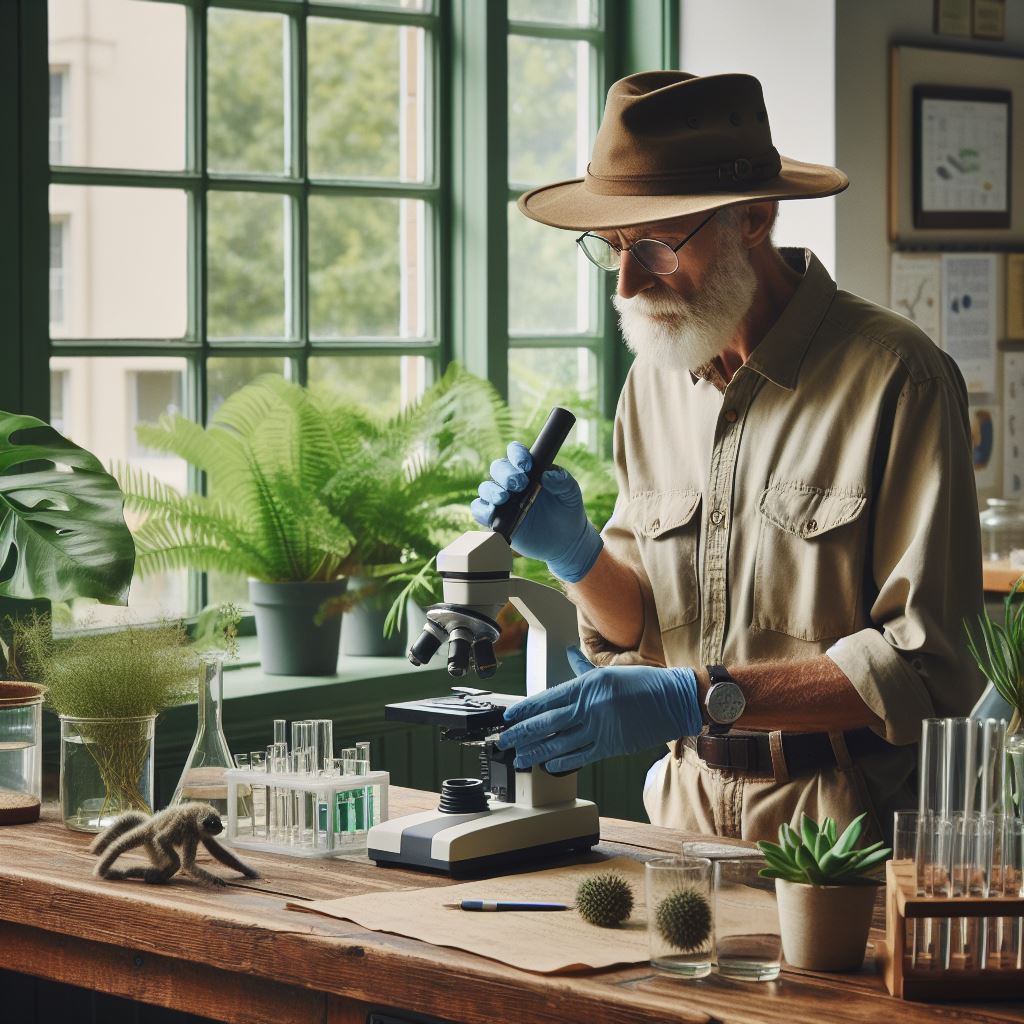Introduction
Embarking on a career in biology in Australia opens doors to a world of scientific and medical possibilities, shaping the nation’s advancements in these critical fields.
This blog post serves as an extensive guide, meticulously navigating the intricate landscape of biology careers, ensuring that aspiring professionals make well-informed decisions that align with their aspirations.
Australia’s scientific and medical sectors offer a diverse array of opportunities within the realm of biology, making it essential to comprehend the nuances of potential career paths.
This guide aims to be a beacon, illuminating the various avenues available in biological sciences, be it research, environmental science, or medical biology.
Readers will find a wealth of information, from academic prerequisites to the practical intricacies associated with different roles within the field.
By providing insights into the required skills, qualifications, and responsibilities tied to diverse biology careers, this guide empowers individuals to tailor their journeys to their unique strengths and ambitions.
The dynamic nature of biology, coupled with the ever-evolving research landscape, underscores the importance of staying abreast of the latest trends and opportunities.
This comprehensive guide ensures that readers are well-equipped to navigate the dynamic world of genetics, microbiology, ecology, bioinformatics, and beyond.
In essence, this guide strives to be an indispensable resource, offering in-depth insights for individuals embarking on or contemplating a journey into the captivating and impactful realm of biology careers in Australia.
Overview of Biology Careers in Australia
- Biotechnologist: Conduct research and develop products using biological organisms.
- Microbiologist: Study microorganisms and their impact on health, the environment, and industry.
- Geneticist: Investigate genetic traits and disorders to develop treatments and improve agricultural practices.
- Marine Biologist: Study marine life and their habitats, contributing to conservation efforts and ecological preservation.
- Wildlife Biologist: Conduct research on wildlife species and their ecosystems to aid in conservation and management.
- Botanist: Study plant life, including their physiology, ecology, and classification.
- Biomedical Scientist: Conduct research on human diseases to develop treatments and pharmaceuticals.
- Ecologist: Study the interactions between organisms and their environments, contributing to conservation strategies.
- Environmental Consultant: Assess the impact of human activities on the environment and suggest sustainable practices.
- Pharmaceutical Scientist: Develop and test medications to improve human health and wellbeing.
The significance of biology in various industries
- Healthcare: Biology plays a crucial role in understanding diseases, developing treatments, and conducting medical research.
- Agriculture: Studying biology helps improve crop yield, develop genetically modified organisms, and manage pests.
- Environmental Conservation: By understanding ecosystems and biodiversity, biology aids in preserving natural resources.
- Biotechnology: Biology drives advancements in gene editing, biofuel production, and fermentation processes.
- Pharmaceutical Industry: Biology is essential for drug discovery and development, ensuring safe and effective medications.
- Food Science: Studying biology helps develop methods to improve food quality, safety, and nutritional value.
- Forensics: Biology techniques, such as DNA analysis, assist in solving crimes and identifying human remains.
- Education: Biology provides the foundation for teaching future generations about living organisms and their importance.
- Zoos and Wildlife Parks: Biologists contribute to the care and conservation of animals in captivity.
- Genetics and Genomics: Biology plays a vital role in understanding inherited traits and developing personalized medicine.
The promising job opportunities in the field
- Growing Field: With advancements in technology and increasing environmental concerns, biology careers are in high demand.
- Job Security: Positions in biology offer stability as they cater to essential industries like healthcare and agriculture.
- Global Opportunities: Biology professionals can work internationally, contributing to research and conservation efforts worldwide.
- Fulfilling Work: Biology careers allow individuals to make a meaningful impact by improving human and environmental health.
- Competitive Salaries: With specialized knowledge and skills, biology professionals can earn attractive salaries.
- Continuous Learning: Biology is a dynamic field, offering opportunities for research, innovation, and lifelong learning.
- Career Progression: Biology professionals can progress into leadership roles, managing research projects and teams.
- Networking: Biology careers provide chances to collaborate with experts and establish valuable professional connections.
- Flexibility: Professionals can work in a range of settings, including labs, fieldwork, and academic institutions.
- Personal Satisfaction: The chance to contribute to scientific discoveries and make a difference in the world is highly rewarding.
Basically, biology careers in Australia offer diverse opportunities in fields like biotechnology, healthcare, and environmental conservation.
The significance of biology across various industries cannot be overlooked, as it drives advancements, improves human health, and aids in ecological preservation.
With promising job prospects, competitive salaries, and the chance to contribute to research and innovation, pursuing a career in biology can be highly fulfilling and rewarding.
Education and Training for Biology Careers
Academic requirements for entering the field
- Completion of high school with a strong focus on science subjects.
- Obtaining good grades in biology, chemistry, and mathematics is essential.
- Some universities may require additional prerequisites like physics or English.
- A strong foundation in scientific research methods and data analysis is beneficial.
- Applicants may need to pass entrance exams or interviews for certain programs.
Various degree options available in Australia for biology
- Bachelor’s degree: Most entry-level positions require a 3-4 year undergraduate degree.
- Specialization options include molecular biology, ecology, biotechnology, or genetics.
- Master’s degree: Provides advanced knowledge and specialization in a specific area of biology.
- Doctoral degree (Ph.D.): Required for research and teaching positions or higher-level careers.
Importance of work experience and internships
- Gaining practical experience is highly valued by employers in the field of biology.
- Internships provide opportunities to apply theoretical knowledge in real-world settings.
- Work experience helps develop essential skills such as data analysis, lab techniques, and teamwork.
- Employers often prefer candidates with a combination of education and relevant work experience.
- Internships can also lead to networking opportunities and potential job offers.
Professional development opportunities
- Continuing education courses and workshops help professionals stay updated with advancements.
- Attending conferences and seminars provides opportunities for networking and knowledge exchange.
- Professional societies and organizations offer resources, certifications, and career support.
- Engaging in research projects or publishing scientific papers enhances professional credibility.
- Mentorship programs can help individuals navigate their career paths and gain valuable insights.
Acquiring a successful career in biology requires dedication, a strong educational foundation, practical experience, and ongoing professional development.
Understanding the academic requirements, degree options, and the significance of work experience and internships are crucial for aspiring biologists.
Continuous learning and engagement in professional activities contribute to staying competitive and advancing in this dynamic field.
Read: The Future of Green Chemistry in Australia
Popular Biology Careers in Australia
Research careers in academia and industry
- Research careers in universities, research institutes, and pharmaceutical companies involve conducting experiments and analyzing data.
- Grant funding and publishing research papers are crucial for advancing in these careers.
Careers in environmental biology and conservation
- Careers in government agencies, NGOs, and environmental consulting firms focus on protecting and conserving the environment.
- The significance of sustainability and biodiversity conservation is emphasized in these roles.
The healthcare-related biology careers
- Biology careers in hospitals, clinics, and medical research institutions involve diagnosing and treating diseases and conducting medical research.
- There is a high demand for specialists in genetics and biotechnology due to advancements in these fields.
Mention other emerging biology careers in Australia
- Opportunities in bioinformatics, biotechnology, and forensic biology are on the rise.
- These fields have significant growth potential and offer diverse career paths.
Research careers in academia and industry play a vital role in advancing our understanding of biology.
Professionals in these fields work in universities, research institutes, and pharmaceutical companies, conducting experiments and analyzing data to contribute to scientific knowledge.
Grant funding and publishing research papers are crucial for career advancement in these sectors.
Environmental biology and conservation offer rewarding careers focused on protecting and preserving the environment.
Individuals can work in governmental agencies, non-governmental organizations (NGOs), and environmental consulting firms.
These roles involve conducting research, implementing conservation plans, and promoting sustainable practices.
The importance of sustainability and biodiversity conservation is emphasized in these positions, as they aim to maintain ecological balance and protect natural resources.
Read: Australian Women in Chemistry: Trailblazers
Popular Biology Careers in Australia
Healthcare-related biology careers are dedicated to improving human health.
Professionals in hospitals, clinics, and medical research institutions diagnose and treat diseases, conduct medical research, and develop innovative therapies.
Specialized areas such as genetics and biotechnology have seen significant demand due to advancements in these fields.
These careers require a strong foundation in biology and a commitment to making a positive impact on people’s lives.
Australia also offers emerging biology careers in fields like bioinformatics, biotechnology, and forensic biology.
Bioinformatics involves the analysis of biological data using computational tools and techniques.
Biotechnology focuses on utilizing living organisms or their products for practical applications, such as developing new medicines or improving crop yields.
Forensic biology combines biology and criminal justice, assisting in crimes investigations through the analysis of biological evidence.
These fields offer exciting opportunities and have considerable growth potential in Australia.
Fact, biology careers in Australia encompass a wide range of disciplines, including research, environmental conservation, healthcare, and emerging fields like bioinformatics and biotechnology.
Professionals in these areas contribute to scientific knowledge, protect the environment, improve human health, and advance technological innovations.
The diverse career paths and growth potential in these fields make biology an exciting and promising choice for individuals interested in the life sciences.
Read: Balancing Lab Work and Life in Australia

Skillset and Competencies Required for Biology Careers
List essential technical skills for different biology careers
- Proficiency in laboratory techniques such as DNA sequencing, microscopy, and cell culture.
- Advanced knowledge of molecular biology, genetics, and biochemistry.
- Familiarity with data analysis tools and statistical software for interpreting research findings.
- Expertise in fieldwork and environmental sampling techniques for ecological and environmental roles.
- Fluency in bioinformatics and computational biology to analyze complex biological data sets.
The importance of analytical and problem-solving abilities
Analytical and problem-solving abilities are crucial in biology careers as they help professionals in:
- Identifying patterns and trends in research data to draw meaningful conclusions.
- Troubleshooting technical issues and optimizing experimental protocols.
- Developing innovative solutions to scientific challenges.
- Designing experiments and formulating hypotheses to address research questions.
- Evaluating and interpreting complex scientific literature for informed decision-making.
The need for strong communication and collaboration skills
Effective communication and collaboration skills are essential for successful biology careers because:
- Scientists need to disseminate research findings through scientific writing and presentations.
- Collaboration enables interdisciplinary approaches and fosters innovation in scientific research.
- Effective communication nurtures productive relationships with colleagues, stakeholders, and the public.
- Collaboration facilitates teamwork, enabling scientists to tackle complex biological problems collectively.
- Scientists need to communicate scientific concepts to non-experts, policymakers, and funding agencies.
The significance of adaptability and continuous learning
Adaptability and continuous learning are key in biology careers due to the ever-evolving nature of science:
- Adaptability enables scientists to adjust to new technologies, methodologies, and research directions.
- Continuous learning allows professionals to stay updated with the latest advancements in their field.
- Adapting to diverse research settings and interdisciplinary collaborations enhances career flexibility.
- Continuous learning equips scientists with the skills needed to tackle emerging scientific challenges.
- Adaptable professionals are more likely to succeed in a rapidly changing scientific landscape.
Review, biology careers in Australia require a specific set of skills and competencies.
Technical skills, analytical abilities, communication and collaboration skills, as well as adaptability and continuous learning are crucial for success in this field. By acquiring and honing these competencies,
individuals can thrive in diverse biology career paths and contribute to advancements in the life sciences.
Read: Navigating Chem Grad Studies in Australia
Job Market and Salary Expectations
Overview of the Current Job Market for Biology Careers in Australia
The job market for biology careers in Australia is highly competitive and dynamic. Many industries and sectors require professionals with expertise in biology, leading to a wide range of job opportunities.
Factors Affecting Job Opportunities in the Field
Several factors impact job opportunities in the biology field in Australia. These include advancements in technology, government funding for research, and industry demands. Professionals with specialized skills and qualifications have better chances of securing positions.
Your Personalized Career Strategy
Unlock your potential with tailored career consulting. Get clear, actionable steps designed for your success. Start now!
Get StartedSalary Ranges for Different Biology Careers in Australia
The salary ranges for biology careers in Australia vary depending on the specific job role, level of experience, and location. However, in general, biology professionals in Australia can expect competitive salaries.
- Research Assistants: The salary range for research assistants is typically between $45,000 and $70,000 per year.
- Biotechnologists: Biotechnologists can earn salaries ranging from $60,000 to $90,000 per year.
- Wildlife Biologists: Wildlife biologists can expect salaries between $70,000 and $100,000 per year.
- Environmental Consultants: Environmental consultants earn annual salaries ranging from $80,000 to $120,000.
- Pharmaceutical Researchers: Pharmaceutical researchers can earn salaries ranging from $80,000 to $150,000 per year.
It is important to note that these salary ranges are approximate and may vary based on factors such as experience, qualifications, and the organization’s size and location.
Potential for Career Growth and Progression
Biology careers in Australia offer significant potential for career growth and progression. With advancements in research and technology, the demand for skilled professionals continues to increase.
- Specialization: Professionals can specialize in areas such as molecular biology, genetics, or bioinformatics, allowing them to become experts in their chosen field
- Higher Education: Pursuing advanced degrees such as a Master’s or Ph.D. can open up opportunities for leadership positions and higher salaries.
- Industry Experience: Gaining experience in industry settings through internships or work placements can enhance career prospects.
- Research Funding: Securing research funding can lead to independent research projects and potential collaborations with renowned institutions, boosting career advancement.
- Professional Networks: Building strong professional networks through conferences, workshops, and industry events can provide access to job opportunities and mentorship.
On a final note, the job market for biology careers in Australia is competitive, but offers a wide range of opportunities. Salaries for biology professionals are competitive, with variations depending on the specific role.
Additionally, there is significant potential for career growth and progression through specialization, higher education, industry experience, research funding, and networking.
You Might Also Like: Marine Biology Tech and Innovations
Gain More Insights: Lab Tech Roles in Australia’s Research Sector
Tips for Success in Biology Careers
Networking and Building Professional Relationships
- Networking is crucial for success in biology careers as it helps expand professional connections.
- Attend conferences, seminars, and workshops to meet individuals working in the same field.
- Join professional organizations and associations to connect with like-minded professionals.
- Actively engage in online platforms and social media to develop a strong professional network.
- Building relationships with mentors and experienced professionals can provide valuable guidance and support.
Importance of Staying Updated with Advancements in the Field
- Stay informed about the latest research, discoveries, and advancements in the field of biology.
- Read scientific journals, research papers, and attend scientific lectures to stay abreast of current trends.
- Regularly update your knowledge by participating in professional development courses and workshops.
- Use online resources, podcasts, and webinars to stay updated with the ever-evolving field of biology.
- Being up-to-date enhances your credibility and ensures you remain competitive in the job market.
Tips for Gaining Practical Experience and Enhancing Practical Skills
- Seek internships, research assistant positions, or volunteer work to gain hands-on experience.
- Collaborate with professors, researchers, and professionals to work on real-world projects.
- Participate in fieldwork, lab work, or clinical trials to develop practical skills.
- Take advantage of simulation software and virtual laboratories to enhance technical expertise.
- Continuously seek opportunities to apply theoretical knowledge into practical scenarios.
Significance of a Positive Attitude and Perseverance
- Maintain a positive attitude towards challenges, setbacks, and failures in your biology career.
- Persevere through difficulties and setbacks, as they are commonly encountered in scientific research.
- Embrace failures as learning opportunities and use them to grow professionally.
- Develop resilience and the ability to bounce back from setbacks, as it is vital for success.
- Stay committed to your goals, remain focused, and believe in your capabilities to overcome obstacles.
Generally, succeeding in biology careers requires more than just knowledge and skills. Networking, staying updated, gaining practical experience, and maintaining a positive attitude are equally important factors that contribute to long-term success in this dynamic and exciting field.
Find Out More: Women in AU Science: Research Careers
Find Out More: Chemistry Education Trends in Australia
Gain More Insights: Biology Fieldwork in Australia: What to Expect
Conclusion
This comprehensive blog post serves as an in-depth guide to navigate the myriad biology careers available in Australia, shedding light on their distinctive benefits and promising avenues for professional growth.
Australia stands as a formidable hub for scientific research, boasting robust institutions and a unique array of ecosystems, making the exploration of biology careers within the country particularly compelling.
The narrative encourages readers, especially aspiring professionals, to delve further into the wealth of resources and opportunities that characterize the realm of biology careers in Australia.
By understanding the dynamic landscape and evolving demands of the field, individuals can make informed decisions that align with their passions, contributing meaningfully to the continuous advancements within the captivating domain of biology.
Whether one aspires to immerse themselves in research, conservation, or healthcare, this guide offers valuable insights to shape a fulfilling and impactful career journey in the biological sciences.




